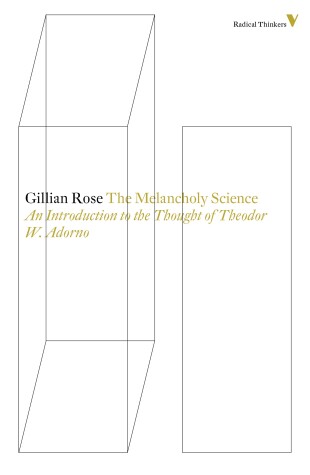Radical Thinkers
3 total works
Series 4
This original and challenging book presents a radical revision of traditional assessments of Hegel. Gillian Rose argues that the classical origins of contemporary non-Marxist and Marxist sociology rest on the -neo-Kantian' paradigm and that Hegel's thought anticipates and criticises the limitations of this pardaigm and the problems of methodologism and moralism in sociological method. Hegel's major mature works are expounded in the light og his early radical writings. From this unusal perspective Dr Rose shows that Hegel's speculative discourse is a powerful critique of bourgeois property relations and law, of art and religion as misrepresentation and of the inversions and end of culture. The book concludes with a discussion of the end of philosophy, the repetition of sociology and the culture and fate of Marxism.
This volume challenges the philosophical presentation of Judaism as the sublime "other" of modernity. Gillian Rose continues to develop a philosophical alternative to deconstruction and post-modernism by critically re-engaging the social and political issues at stake in every reconstruction. The chapters cover Judaism and philosophy, ethics and law (Halacha), "The Future of Auschwitz", post-modern theology, Judaism and architecture, Judaism in Hegel, Nietzsche, Adorno and Derrida, and modern Jewish thinkers - Cohen, Rosenzweig, Buber, Benjamin, Strauss, Arendt, Weil and Levinas. The opposition between philosophical reason and Judaic ethics is shown to ruin the possibility of critical reflection and of political action. The risks of critical rationality are reformulated for modern philosophy and for modern Jewish thought.
The Melancholy Science is Gillian Rose's investigation into Theodor Adorno's work and legacy. Rose uncovers the unity discernable among the many fragments of Adorno's oeuvre, and argues that his influence has been to turn Marxism into a search for style.
The attempts of Adorno, Lukacs and Benjamin to develop a Marxist theory of culture centred on the concept of reification are contrasted, and the ways in which the concept of reification has come to be misused are exposed. Adorno's continuation for his own time of the Marxist critique of philosophy is traced through his writings on Hegel, Kierkegaard, Husserl and Heidegger. His opposition to the separation of philosophy and sociology is shown by examination of his critique of Durkheim and Weber, and of his contributions to the dispute over positivism, his critique of empirical social research and his own empirical sociology.
Gillian Rose shows Adorno's most important contribution to be his founding of a Marxist aesthetic that offers a sociology of culture, as demonstrated in his essays on Kafka, Mann, Beckett, Brecht and Schoenberg. Finally, Adorno's 'Melancholy Science' is revealed to offer a 'sociology of illusion' that rivals both structural Marxism and phenomenological sociology as well as the subsequent work of the Frankfurt School.
The attempts of Adorno, Lukacs and Benjamin to develop a Marxist theory of culture centred on the concept of reification are contrasted, and the ways in which the concept of reification has come to be misused are exposed. Adorno's continuation for his own time of the Marxist critique of philosophy is traced through his writings on Hegel, Kierkegaard, Husserl and Heidegger. His opposition to the separation of philosophy and sociology is shown by examination of his critique of Durkheim and Weber, and of his contributions to the dispute over positivism, his critique of empirical social research and his own empirical sociology.
Gillian Rose shows Adorno's most important contribution to be his founding of a Marxist aesthetic that offers a sociology of culture, as demonstrated in his essays on Kafka, Mann, Beckett, Brecht and Schoenberg. Finally, Adorno's 'Melancholy Science' is revealed to offer a 'sociology of illusion' that rivals both structural Marxism and phenomenological sociology as well as the subsequent work of the Frankfurt School.

